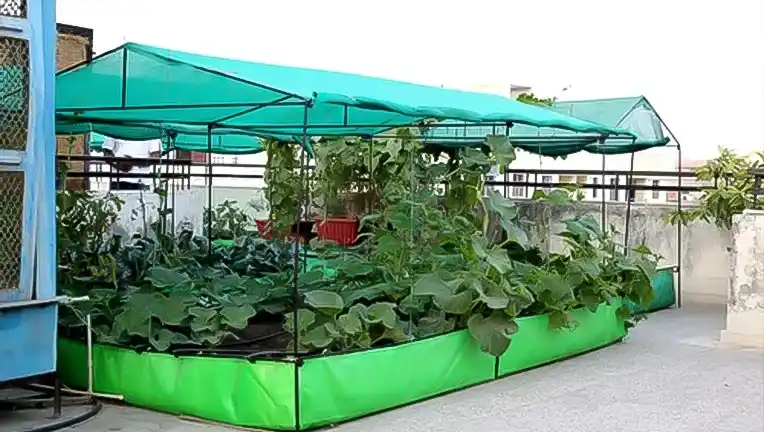Farmers increasingly turn to innovative techniques to enhance crop productivity and safeguard yields in today’s agriculture. Sunshade net farming and Poly House Farming have emerged as frontrunners, each offering unique advantages. In this VJ tarpaulins blog, we’ll delve into the world of Shade Net farming and Poly House farming, exploring their benefits, drawbacks, and ultimately answering the question, is shade net farming more profitable than poly house farming? considering factors such as cost-effectiveness, adaptability, and environmental control. Farmers can make informed decisions that align with their specific needs and aspirations by understanding the nuances of Sunshade Net and Agriculture Poly House farming.
Shade Net farming, also known as Garden Shade Net or Green Net for Garden or Sunshade net farming, involves the use of specialized nets that provide controlled shading to crops. These nets come in various densities, allowing farmers to regulate the amount of sunlight reaching the plants. The primary purpose of Sunshade netting is to protect crops from excessive sunlight, harsh weather conditions, and pests while promoting optimal growth.
On the other side of the spectrum is Poly House Farming, also known as Agriculture Poly House. Poly House Farming are essentially controlled-environment structures made of polyethylene material. These structures offer a more comprehensive level of control over environmental factors, including temperature, humidity, and light exposure. Poly House Farming is known for its versatility, enabling year-round cultivation of a wide variety of crops.
The initial investment in Agriculture Poly House Farming is significantly higher than shade net farming. However, proponents argue that the long-term benefits, such as increased yield, quality, and reduced dependency on external factors, make it a worthwhile investment.
A recent innovation in shade net farming is the introduction of Waterproof Shade Nets. Waterproof Shade Nets specialized nets not only shield crops from sunlight but also provide protection against heavy rainfall. Waterproof Shade Nets feature is particularly beneficial in regions prone to unpredictable weather patterns, allowing for year-round cultivation without the risk of water damage.
Now, let’s consider the profitability of Garden Shade Net farming against Poly House Farming. Several factors contribute to the overall profitability of each method.
Each Farming method boasts unique applications and advantages, catering to diverse farming needs.
Shade Net Farming is a deal for vegetables that thrive in partial sunlight, such as lettuce, spinach, and certain varieties of tomatoes.
Poly House Farming offers a controlled environment suitable for a broader range of vegetables, including heat-sensitive ones like bell peppers and cucumbers.
Shade Net Farming flourishes by cultivating shade-loving ornamental plants like ferns, orchids, and begonias.
Poly House Farming is well-suited for high-value flowers such as roses and gerberas. Poly House Farming enables precise control over temperature and humidity, resulting in superior flower quality and prolonged blooming periods, essential for the floriculture industry.
Seasonal Crop Protection:
Sunshade Net Farming is an excellent choice for protecting seasonal crops from intense sunlight during peak summer months. Water-resistant shade nets add an extra defense against unpredictable rainfall, ensuring yields remain unharmed.
Poly House Farming protects against extreme weather conditions, including heavy rain, frost, and storms.
Cost-Effectiveness for Small-Scale Farmers:
Sunshade Net Farming is particularly advantageous for small-scale farmers with budget constraints. The affordability of Garden Shade Net installation and minimal operational costs make it an accessible choice for those entering or expanding in agriculture.
While the initial investment is higher, Poly House Farming can be cost-effective in the long run. The increased yield and quality of crops may offset the initial expenses, making it a strategic choice for farmers aiming for sustained profitability.
Shade Net Farming Offers a simple solution for creating localized microclimates, making it suitable for specific crops that require protection from harsh sunlight but can thrive outdoors.
Poly House Farming provides unparalleled control over the microclimate, allowing farmers to tailor conditions precisely to the needs of each crop. Agriculture Poly House flexibility is invaluable for cultivating various crops with varying climate preferences.
There’s no one-size-fits-all solution in the intricate dance between Sunshade net farming and Poly House Farming. Each method holds its own under the spotlight of specific applications. Whether you seek the gentle caress of a Garden Shade Net or the meticulous embrace of Poly House Farming, the key is aligning the method with your crop dreams. So, choose the path that leads to your bountiful harvest with VJ tarpaulins.








